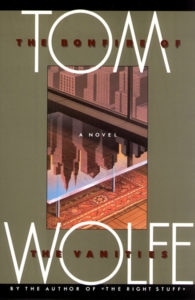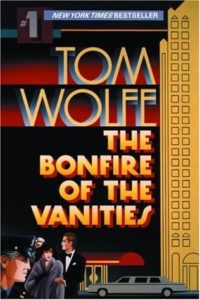

Bullshit reigns
*
“Now comes Tom Wolfe, aging enfant terrible, with his first novel, (his first novel!), six hundred and fifty-nine pages of raw energy about New York City and various of its inhabitants – a big, bitter, funny, craftily plotted book that grabs you by the lapels and won’t let go. As in much of his other work, such as The Right Stuff, Mr. Wolfe’s strategy is to somehow batter the reader into submission, using an incantatory repetition of certain emblematic phrases, (HIS FIRST NOVEL!), detailed description of people’s clothing, hyperbole, interior monologue whenever he feels like it, and various other New Journalism devices he is apparently too fond of to give up. What is amazing is that he gets away with it.
…
“There are dozens of minor characters on each track, and Mr. Wolfe does a fine job of keeping them all under control and in clear focus, while the major characters spiral in on each other toward the final explo-sive courtroom scene. Mr. Wolfe writes in such a way as to make us read him quickly. Very quickly. (Indeed, if one lingers over the pages the sensation is something like hearing a 78 r.p.m. record played at 33 1/3. One perceives the structure, but misses the essence.) Fast as it is – like falling downstairs, sometimes – the pace is superb, and the action, twists of plot, comic setups and jumps from track to track always occur at just the right times.
The plot is simple. Sherman screws up and the dark forces of the city close in on his rich white butt – but the presentation, or the attenuated revelation of the plot, is admirably complex, and allows for the weaving in of much interesting ancillary material. Mr. Wolfe never cheats the reader. He works hard to get every last bit of juice from every scene, every situation.

And yet, when the author has let go of your lapels and the book is over, there is an odd aftertaste, not entirely pleasant. Maybe he doesn’t entirely get away with it.
Homophonic attempts to recreate regional or class accents are only irritating … Mr. Wolfe misses, it seems to me, because of a tendency to embrace the grotesque. It is the fact of an accent, rather that the quality or nature of it, that interests him. Elmore Leonard, for instance, goes after the sound and rhythm of certain accents, and does it very well without any tortured spelling. (So does James Baldwin, for that matter.) Mr. Wolfe writes with another agenda, with a kind of malicious glee, and exaggerates in order to make fun of his characters, with whom, truth be told, he has not much sympathy. What they say is fine -the dialogue is fine – but I wish he’d just let them say it, and let my own ear do the work.

“The odd aftertaste may be in part because there aren’t any people in the book who seem to exist independent of the author’s will, no one with enough depth to surpass his or her accent, clothing, class or situation, no one for whom believable change is possible. They are all victims of fashion or other surface forces. The fun of the book, and much of its energy, comes from watching Mr. Wolfe eviscerate one pathetic character after another. And he is good at it, really brilliant sometimes – whether it be a society matron or a Jewish business tycoon making money running charter jets to Mecca for Arabs – but after a while, when it turns out that everyone is pathetic (except for me and thee, of course), the fun can turn sour. Malice is a powerful spice. Too much can ruin the stew, and Mr. Wolfe comes close.
But in the end everyone is going to read the book, and no one is going to ask for any money back. It positively hums with energy.”
–Frank Conroy, The New York Times, November 1, 1987
If you buy books linked on our site, Lit Hub may earn a commission from Bookshop.org, whose fees support independent bookstores.

